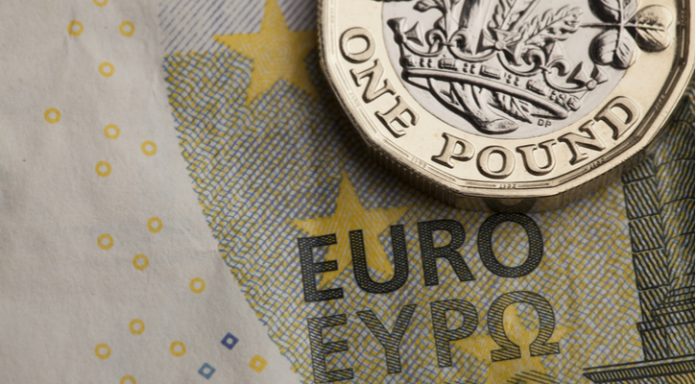The pound charged higher versus the euro on Thursday after the Bank of England (BoE) hinted at sooner and faster interest rate rises. The pound euro exchange rate soared over 110 points or 1%, to hit €1.1450, taking the rate back to levels seen at the beginning of February, before easing back towards the close.
| What do these figures mean? |
|---|
|
When measuring the value of a pair of currencies, one set equals 1 unit and the other shows the current equivalent. As the market moves, the amount will vary from minute to minute. For example, it could be written: 1 GBP = 1.13990 EUR Here, £1 is equivalent to approximately €1.14. This specifically measures the pound’s worth against the euro. If the euro amount increases in this pairing, it’s positive for the pound. Or, if you were looking at it the other way around: 1 EUR = 0.87271 GBP In this example, €1 is equivalent to approximately £0.87. This measures the euro’s worth versus the British pound. If the sterling number gets larger, it’s good news for the euro. |
The Bank of England’s Monetary Policy Committee (MPC) voted to keep interest rates on hold at 0.5%, as analysts had been expecting. However, the central bank also hinted at rates rises coming sooner and potentially faster than the bank had forecast in November.
BoE Governor Mark Carney, pointed to faster global economic growth supporting growth in the UK, which resulted in the BoE increasing their economic outlook. Meanwhile, the bank anticipates that inflation will remain elevated and above the set 2% target level. The BoE explained that these conditions could lead to 2 rate rises this year, the market assuming the first could be as soon as May. The pound rallied hard on the prospect of increased interest rates
| Why do raised interest rates boost a currency’s value? |
|---|
| Interest rates are key to understanding exchange rate movements. Those who have large sums of money to invest want the highest return on their investments. Higher interest rate environments tend to offer higher yields. So, if the interest rate or at least the interest rate expectation of a country is relatively higher compared to another, then it attracts more foreign capital investment. Large corporations and investors need local currency to invest. More local currency used then boosts the demand of that currency, pushing the value higher. |
Today, investors will switch their attention to a slew of economic data releases, including industrial production, construction output and manufacturing production, as well as the NIESR GDP estimate for January. Weaker than forecast figures could concern traders that the UK economy is not ready for rate rises to come sooner.
| Why does poor economic data drag on a country’s currency? |
|---|
| Slowing economic indicators point to a slowing economy. Weak economies have weaker currencies because institutions look to reduce investments in countries where growth prospects are low and then transfer money to countries with higher growth prospects. These institutions sell out of their investment and the local currency, thus increasing supply of the currency and pushing down the money’s worth. So, when a country or region has poor economic news, the value of the currency tends to fall. |
Eurozone Inflation Remains an issue for the ECB
The European Central Bank’s (ECB) Economic Bulletin, did little to boost investor appetite for the euro. The report once again highlight inflation concerns within the bloc. The report said that the eurozone is yet to show any convincing signs of a sustained upward trend in inflation. Despite strong economic growth, the bloc continues with sluggishly low inflation, which is taking longer to move towards the ECB’s 2% target level than the central bank was initially anticipating. With inflation set to remain low for longer, the ECB are unlikely to start tightening monetary policy by hiking interest rates soon.
Today there is no high impacting eurozone economic data, so UK data is more likely to move the pound euro exchange rate.
|
This article was initially published on TransferWise.com from the same author. The content at Currency Live is the sole opinion of the authors and in no way reflects the views of TransferWise Inc. |





